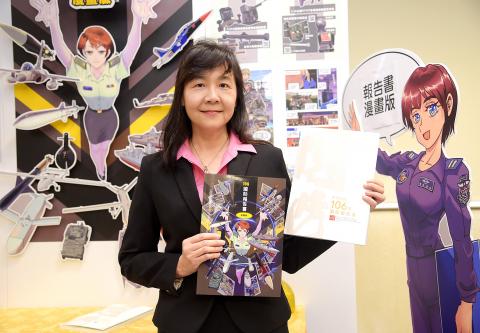The Ministry of National Defense yesterday unveiled its biennial white paper on national defense, outlining doctrinal changes that emphasize asymmetric warfare and layered defense.
The 2017 National Defense Report reiterates the military’s commitment to an all-volunteer force and the indigenous development of military aircraft and warships.
“We are cognizant that our nation cannot compare with the defense budget and military development in China, whose military’s pace of growth and strength have far exceeded expectations,” Minister of National Defense Feng Shih-kuan (馮世寬) said in the report.

Photo: Huang Yao-cheng, Taipei Times
“Consequently, we must employ vision and foresight in our adjustment of defense concepts and overall armament development,” he said.
China has acquired the ability to execute long-range sea and air operations, and it is pushing the reach of its force projection to the areas west of the second island chain, the report said.
The second island chain refers to Japan’s Bonin Islands and Volcano Islands, and the US’ Mariana Islands.
Those developments necessitate a change in the nation’s strategy from “strong defense and effective deterrence” — which had been in effect since 2009 — to “strong defense and layered deterrence,” the report said.
Strong defense refers to in-depth defense, improving combat sustainability, protecting command and control infrastructure from cyberthreats, and developing strategic endurance, it said.
Layered deterrence involves using “innovative and asymmetrical warfare” that confronts the enemy with multiple dilemmas to achieve deterrence, it said.
The overall military strategy in a defensive war is to achieve “force preservation, win decisive battles in littoral waters and annihilate the enemy on the beachhead,” the report said.
It is desirable for the military to acquire precision-guided munitions, electronic countermeasures, guided anti-tank missiles, man-portable air defense systems, fast multiple-role warships, uncrewed aerial vehicles and naval minelaying capabilities, among others, the report said.
The report listed Chinese air and sea drills conducted between Aug. 18 last year and Dec. 11, including 23 air patrols and two aircraft carrier exercises in proximity to Taiwan’s territorial waters or air defense identification zone.
The ministry will stop giving news briefings on ongoing Chinese military exercises near Taiwan, ministry spokesman Major General Chen Chung-chi (陳中吉) told a news conference in Taipei.
“When Chinese aircraft and ships are not posing any more threat to us than usual, we see no need to help them with their propaganda,” he said.

NATIONAL SECURITY THREAT: An official said that Guan Guan’s comments had gone beyond the threshold of free speech, as she advocated for the destruction of the ROC China-born media influencer Guan Guan’s (關關) residency permit has been revoked for repeatedly posting pro-China content that threatens national security, the National Immigration Agency said yesterday. Guan Guan has said many controversial things in her videos posted to Douyin (抖音), including “the red flag will soon be painted all over Taiwan” and “Taiwan is an inseparable part of China,” while expressing hope for expedited “reunification.” The agency received multiple reports alleging that Guan Guan had advocated for armed reunification last year. After investigating, the agency last month issued a notice requiring her to appear and account for her actions. Guan Guan appeared as required,

A strong cold air mass is expected to arrive tonight, bringing a change in weather and a drop in temperature, the Central Weather Administration (CWA) said. The coldest time would be early on Thursday morning, with temperatures in some areas dipping as low as 8°C, it said. Daytime highs yesterday were 22°C to 24°C in northern and eastern Taiwan, and about 25°C to 28°C in the central and southern regions, it said. However, nighttime lows would dip to about 15°C to 16°C in central and northern Taiwan as well as the northeast, and 17°C to 19°C elsewhere, it said. Tropical Storm Nokaen, currently

‘NATO-PLUS’: ‘Our strategic partners in the Indo-Pacific are facing increasing aggression by the Chinese Communist Party,’ US Representative Rob Wittman said The US House of Representatives on Monday released its version of the Consolidated Appropriations Act, which includes US$1.15 billion to support security cooperation with Taiwan. The omnibus act, covering US$1.2 trillion of spending, allocates US$1 billion for the Taiwan Security Cooperation Initiative, as well as US$150 million for the replacement of defense articles and reimbursement of defense services provided to Taiwan. The fund allocations were based on the US National Defense Authorization Act for fiscal 2026 that was passed by the US Congress last month and authorized up to US$1 billion to the US Defense Security Cooperation Agency in support of the

PAPERS, PLEASE: The gang exploited the high value of the passports, selling them at inflated prices to Chinese buyers, who would treat them as ‘invisibility cloaks’ The Yilan District Court has handed four members of a syndicate prison terms ranging from one year and two months to two years and two months for their involvement in a scheme to purchase Taiwanese passports and resell them abroad at a massive markup. A Chinese human smuggling syndicate purchased Taiwanese passports through local criminal networks, exploiting the passports’ visa-free travel privileges to turn a profit of more than 20 times the original price, the court said. Such criminal organizations enable people to impersonate Taiwanese when entering and exiting Taiwan and other countries, undermining social order and the credibility of the nation’s